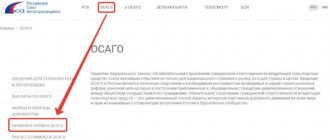One of the mandatory documents that every car driver in our country must have is an MTPL insurance agreement. Its conclusion is made on the basis of an application submitted by the policyholder to the insurance company of his choice. Moreover, such a statement must not only contain the necessary information, but also be in accordance with the general requirements for office work.
Any driver will benefit from information about how and in what sequence the stages of concluding an insurance transaction are carried out. We will tell you about all the nuances of obtaining an MTPL policy in this article.
What is a compulsory motor liability insurance agreement?
To regulate compulsory insurance, Federal Law No. 40 (Article 15) is used. Here in paragraph 1 it is said that insurance (compulsory) is carried out by the car owner by drawing up a special contract for compulsory insurance.
This document indicates the vehicle (hereinafter referred to as the vehicle), the owner of which has properly insured his civil liability.
An MTPL insurance contract is a document confirming the obligation of the insurance company (hereinafter referred to as the insurer) to compensate/pay compensation for damage caused to the health, life or property of the injured party as a result of an accident. At the same time, the document clearly states in a separate paragraph the amount within which such compensation will be made.
It should be noted that such an agreement is drawn up on a reimbursable basis.
General information
The MTPL policy is mandatory. Driving without insurance is an administrative offense. For such an offense, drivers face liability and punishment in the form of a fine or deprivation of their license.
It is important to know! OSAGO is designed to protect the material interests of the culprit of the accident and the injured party. When an insured event occurs, the insurance company compensates the damage to the victims. Payments are made to reimburse expenses associated with the repair of a car damaged as a result of an accident, other property and treatment of passengers.
Issuing a policy is the responsibility of both individuals and legal entities. To obtain it, you need to submit an application for compulsory motor liability insurance to the insurance company, provide a number of documents and certificates, and undergo a technical inspection. The insurance company representative is required to consider the client’s application within 30 days and, in case of refusal, indicate the reasons. The driver can file a claim or go to court to obtain the policy.
MTPL agreement: basic concepts
Among the legal features of such contractual obligations for motor vehicle citizenship are:
- Consensus – events that are expected to occur in the future are written down;
- 2-party – always concluded between 2 parties (the policyholder and the insurer);
- Reciprocity - is made solely by mutual consent of the parties;
- Payment – involves the obligatory payment of an insurance premium (payment).
This type of agreement must be concluded in writing, and if this does not happen, then the document is considered void.
In the document, the parties to the agreement are 2 persons, namely:
- The policyholder can be either an individual or a legal entity. The individual signs the agreement personally, and on the part of the legal entity - his authorized representative;
- Insurer – insurance company (always a legal entity).
By concluding a contract, the policyholder (car owner) pursues the goal of: at the expense of the insurer, to compensate for losses to 3rd parties. From this we can conclude that contractual relations are concluded in the interests of third parties (their circle is unlimited and they are not directly indicated in the contract). Such a third party can be any person (individual/legal entity). It depends on who and whose particular interests were damaged in the accident.
Government agencies are a special subject of the agreement, since without action on their part no payments will occur. After all, the party injured in an accident can hope to receive compensation for damage from the insurer only if it provides a certificate of the accident, which is drawn up by traffic police officers.
According to compulsory motor liability insurance, the object of contractual obligations is understood as the civil liability of the car owner for the harm that he caused by his actions while driving the vehicle. It is important to understand that among the risks there are only such as damage to property, as well as harm caused to the health and life of the injured party. At the same time, the category of compensation under compulsory motor liability insurance does not include moral damage. All losses associated with such harm are determined by the court, which decides the fate of the claim, sent directly to the culprit of the accident.
Subject and object of the MTPL agreement
The objects in this case are civil liability for damage to property or harm caused to third parties by the insured while driving his car.
The subjects in this case are the parties who participate in the insurance: insurance companies, policyholders, as well as other persons to whom compensation will be paid, if necessary.
When concluding contracts for the purchase of compulsory car insurance, not only individuals, but also legal entities can act as policyholders, on whose behalf the document is signed by an authorized representative of the institution.
MTPL agreement: general procedure for registration
The insurance company has 30 days to consider the application submitted by the car owner (based on the Civil Code of the Russian Federation, Article 445, paragraph 1).
After this period, a response must be issued, which may contain one of two options:
- The decision to enter into an agreement;
- Refusal to conclude an agreement indicating the reasons for such a decision.
If a decision is made to satisfy the application, then the insurance agent-representative of the company must carry out calculations of the cost of the policy, taking into account the initial information and the coefficients that are established in a particular case. If a car owner intends to insure a used car, a visual inspection may be necessary. Such actions are aimed at eliminating fraud, since any damage existing at the time of conclusion of the contract is immediately included in a special act.
After the MTPL agreement has been fully prepared, the client is obliged to familiarize himself with it and, if there are no questions on his part, sign it and make payment. Having completed these steps, he receives:
- OSAGO policy;
- Forms for notification of road accidents – 2 copies;
- Memo from the insurance company, etc.
In recent years, car owners have had the opportunity to issue a car insurance policy online. This is done on the web resources of those insurance companies that provide the public with services for issuing auto insurance policies.
The entire process of preparing such a document includes several stages, namely:
- Scanning documents included in the list of mandatory documents for obtaining a motor vehicle license;
- Clarification of data that may be useful for filling out a special form on the website;
- Confirmation of the authenticity of the transaction via an electronic signature;
- Payment for the policy (via the Internet).
Completing all of these operations will not take much time. As a rule, the user spends 30-60 minutes completing all actions.
VS: The MTPL policy applies to legal relations that arose before the signing of the contract
The Supreme Court issued Determination No. 78-KG19-24, in which it explained whether it is possible to pay insurance compensation to a victim in an accident if the tortfeasor entered into a compulsory motor liability insurance contract shortly after the accident.
On the morning of August 11, 2021, citizen Prutkov hit a stationary car belonging to Natalya Degtyareva. An hour and a half later, Prutkov issued an MTPL policy at AlfaStrakhovanie JSC.
The company, citing the fact that the policy was not in effect at the time of the accident, refused to pay the insurance compensation, and Degtyareva filed a claim with the Leninsky District Court of St. Petersburg against the insurer for an insurance payment in the amount of over 337 thousand rubles. for restoration repairs of the car, as well as the collection in her favor of expenses for paying for the services of a representative in the amount of 25 thousand rubles, compensation for moral damage in the amount of 10 thousand rubles. and a fine of 50% of the amount awarded by the court.
The court noted that the insurance policy stated that it was valid from 00:00 am. August 11, 2021, and satisfied the claims in part, halving the amount of compensation for moral damage.
The Judicial Collegium for Civil Cases of the St. Petersburg City Court, in turn, came to the conclusion that at the time of the accident, Prutkov’s civil liability was not insured by AlfaStrakhovanie JSC, since he applied for a policy after this event, and therefore overturned the decision of the first instance and dismissed the claim.
Pointing out the discrepancy between the conclusions of the appellate court and the norms of substantive law, the Presidium of the St. Petersburg City Court proceeded from the fact that the insurance period in the policy is indicated from 00 hours 00 minutes. August 11, 2021, while the defendant did not dispute the validity of the policy and the fact that the insurance premium was paid.
Disagreeing with these decisions, the insurance company appealed to the Supreme Court. In her opinion, the conclusions of the lower courts contradict the norms of substantive law, since insurance applies only to cases that occurred after the conclusion of the insurance contract and its entry into force. Otherwise, an event that occurred before the conclusion of the contract loses its properties of probability and chance, as a result of which it cannot be recognized as an insured event. In addition, the applicant indicated that there was dishonesty and abuse of rights on the part of the policyholder when concluding an insurance contract after an accident.
Having studied the case materials, the Court referred to Resolution of the Plenum of the Supreme Court of June 25, 2015 No. 25 “On the application by courts of certain provisions of Section I of Part One of the Civil Code of the Russian Federation,” which explained that, when assessing the actions of the parties as bona fide or dishonest, one should proceed from the behavior expected from any participant in civil transactions, taking into account the rights and legitimate interests of the other party, assisting it, including in obtaining the necessary information. According to the general rule, paragraph 5 of Art. 10 of the Civil Code, the good faith of participants in civil legal relations and the reasonableness of their actions are assumed until proven otherwise.
The Supreme Court noted that according to the provisions of Art. 309 of the Civil Code, obligations must be fulfilled properly in accordance with the terms of the obligation and the requirements of the law, other legal acts, and in the absence of such conditions and requirements - in accordance with customs or other usually imposed requirements.
He pointed out that Art. 3 of the Law on Compulsory Motor Liability Insurance establishes that one of the basic principles of compulsory insurance is a guarantee of compensation for harm caused to the life, health or property of victims, within the limits established by this law. The preamble of this law also states that it was adopted in order to protect the rights of victims to compensation for harm caused to their life, health or property when using a vehicle by other persons.
“From the above provisions of the law it follows that civil liability insurance for vehicle owners is aimed primarily at increasing the level of protection for victims and at compensating for the harm caused to them. At the same time, the victim is the least protected of all participants in legal relations under compulsory liability insurance, deprived of the opportunity to influence the terms of the liability insurance contract for the tortfeasor, not aware of the circumstances of the conclusion of this contract, due to which he can and has the right to rely in good faith on the information specified in the policy issued by the insurer insurance of a generally compulsory standard,” the Supreme Court concluded.
The highest authority noted that the MTPL policy issued to Prutkov is genuine, drawn up on a form belonging to the defendant, and issued by an authorized person acting on the basis of an agency agreement. According to this policy, the insurer undertook to compensate the victims for damage if it was caused from 00:00 on August 11, 2017. The insurer did not report any unauthorized use of the policy form.
According to the Court, in such circumstances, refusal to satisfy the demands of the victim would be contrary to the provisions of the Civil Code on good faith and proper fulfillment of obligations, as well as established by Art. 3 of the Law on Compulsory Motor Liability Insurance (MTPL) to the principle of guaranteed compensation for harm to victims, despite the fact that the defendant did not provide the grounds provided by law for releasing the insurer from fulfilling its obligations.
The Supreme Court indicated that since the plaintiff was not a party to the agreement concluded between the harm-cauter and the insurer, the defendant’s arguments about the insured’s dishonest behavior cannot be a basis for refusing to satisfy the victim’s claims.
The court also noted that the subject of the dispute in this case is the legal relationship between the insurer and the victim, and not between the insurer and the policyholder. The conscientiousness of Degtyareva, who relied on the policy issued by the insurer, was not disputed by the defendant and was not questioned by the appellate court.
In addition, the Supreme Court emphasized that the insurance contract, in support of which Prutkov was issued a policy, was not challenged by the defendant on the grounds established by law for the invalidity of the transactions and was not declared invalid by the court. He referred to paragraph 2 of Art. 166 of the Civil Code, according to which a party, from whose behavior its will is clear to maintain the validity of the transaction, does not have the right to challenge the transaction on grounds that this party knew or should have known about when manifesting its will.
The Supreme Court recalled that in accordance with paragraph 4 of Art. 166 of the Civil Code, the court has the right to apply the consequences of the invalidity of a void transaction on its own initiative, if this is necessary to protect public interests, and in other cases provided for by law. By virtue of paragraph 5 of this article, a statement about the invalidity of a transaction has no legal significance if the person referring to the invalidity of the transaction acts in bad faith - in particular, if his behavior after the conclusion of the transaction gave grounds for other persons to rely on the validity of the transaction.
The court indicated that according to paragraph 1 of Art. 168 of the Civil Code, with the exception of cases provided for in paragraph 2 of this article or other law, a transaction that violates the requirements of a law or other legal act is voidable, unless it follows from the law that other consequences of the violation not related to the invalidity of the transaction should be applied. By virtue of clause 2 of this article, a transaction that violates the requirements of a law or other legal act and at the same time encroaches on public interests or the rights and interests protected by law of third parties is void, unless it follows from the law that such a transaction is contestable or other consequences of the violation must be applied , not related to invalidity.
“Since in this case no violations of public interests were established and the defendant did not refer to such circumstances, then, by virtue of the above rules of substantive law, the court had no grounds for declaring, on its own initiative, the compulsory motor liability insurance agreement void only in connection with the defendant’s arguments about inconsistency of this contract to the provisions of the law on the concept of insurance risk and insured event,” the definition emphasizes.
Thus, the Supreme Court upheld the decision of the first instance and cassation, and the complaint was not satisfied.
In a commentary to “AG”, Andrei Nosov, a partner at AB “FORTiS” of the Samara region, considered that this definition can confidently be called an example of when the interests of a victim as a result of an accident are protected primarily before other participants in the compulsory civil liability insurance system, and the uncertainty in the relationship between the insured and by the insurer does not affect the rights of the former.
“At the same time, it seems unlikely that this definition will make significant adjustments to the regulation of legal relations of compulsory motor liability insurance, but it once again reminds insurers that there can be no trifles in matters of the conclusion and execution of compulsory motor liability insurance contracts,” he noted.
According to the expert, if the current legislation (taking into account the established judicial practice) allows establishing the validity of a compulsory motor liability insurance agreement for relations that actually arose before its conclusion, then the issues of the presence (or absence) of insured events during the specified controversial period should be given increased attention or not included in validity of the MTPL contract, determining the beginning of the insurance period by the moment the contract is concluded.
Automotive lawyer Yuri Demin considers the court's findings very interesting. “Indeed, the validity period specified in the policy allowed the client to be legally insured at the time of the accident, although in fact he was not,” he explained.
The expert believes that this decision will not be a precedent, since the insurance contract was concluded in 2021. Now insurance companies will simply put the MTPL contracts in order. “In addition, the contract was concluded with an agent. It is quite possible that the validity period of the policy was specified by agreement,” he concluded.
How long is the contract valid?
A separate law on compulsory motor liability insurance (Article 10) regulates the duration of the contract. Often, this period is 1 year, but there is also a minimum period - from 3 months, which is used for car drivers who use their vehicles only during a certain period (for example, in the summer for trips to the country, etc.). It should be noted that in this case the policy cost adjustment factor is applied, which in this case will be equal to 0.5. This means that an adjustment factor is applied to determine the total cost of the policy, lowering the price.
The standard period of validity of the insurance contract (1 year) has certain exceptions, which include the following situations:
The insured is a car owner who has citizenship of another country
Insurance here is concluded for the same period as the duration of registration of a person located in the territory of the Russian Federation along with his vehicle. An insurance agreement with a foreigner can be concluded for a 5-year period.
The contract is temporary
Here we are talking about the validity period of the agreement, which corresponds to the period spent moving the car (for example, from the place of purchase to the place of registration at the nearest traffic police department).
Temporary contract (due to technical inspection)
In the event that, at the request of legislative acts and other regulatory documents, it is necessary to register the vehicle in another region of the Russian Federation, a temporary MTPL agreement will be concluded for the car owner, which will be valid until the vehicle is properly inspected.
There can be many reasons causing the need to re-register a vehicle. Among them:
- purchase and sale transactions, after which it is necessary to have time to insure the vehicle and register it within 10 days;
- change of owner of the vehicle due to inheritance rights;
- changing the place of residence of the car owner with the corresponding registration of the car, etc.
Insurance contract: important terms
By analogy with any legal document, an insurance contract contains a number of points that describe in detail all the nuances of the agreement being concluded. Among them:
- The object of insurance is the vehicle, which is specified in the insurance policy (it is the vehicle that is insured, not the person). To avoid any fraud, the insurance contract indicates the unique serial numbers of the car.
- The list of insured events is regulated within the framework of the Law “On Compulsory Motor Liability Insurance” and is not subject to correction.
- The price of the policy is determined by multiplying a certain basic tariff (regulated by law) by separate coefficients provided for each individual case, namely:
- KBM,
- regional connection,
- car power,
- the number of drivers allowed to drive vehicles, their driving experience, etc.
- The amount of insurance payments is determined by the degree of damage that was caused to the health and personal property of persons injured in an accident. The upper limit of such payments is legally determined, which is:
- 400,000 rub. – for compensation of property damage;
- 500,000 rub. – to compensate for damage caused to the life and health of the victim during a car accident.
- The procedure for early termination of a contract. It is applied in the event that for some reason the insurer does not fulfill its contractual obligations, and involves a full refund to the client of the cost of the MTPL policy.
In the event that a client has sold his car and wants to terminate the insurance contract on his own initiative, he can count on receiving the balance of insurance premiums minus 23%, of which 20% goes to the insurance company for working with the client, and 3% goes to the RSA. .
Essential conditions
This document must necessarily list all the conditions relating to the upcoming transaction, in which two parties become participants - the insurance company and the owner of the vehicle.
Today, the most important conditions include:
- Object of insurance. The conditions specified in the insurance policy apply exclusively to the vehicle recorded in this document. Therefore, it is precisely for this purpose that it is necessary to indicate all license plate information, as well as a unique car number, which is assigned individually for each car by the manufacturing company;
- A list of insurance cases in which the insurer must necessarily cover the costs of car repairs or pay compensation. This list includes all road accidents in which one of the participants was the car specified in the contract, except for the following incidents:
- Accidents involving vehicles whose data is not recorded in the MTPL agreement;
- If the collision occurred while the car was participating in any tests or competitions;
- If the breakdown occurred during the transportation of goods, for the transportation of which it is necessary to take out special additional insurance;
- If the damage is caused during the process of loading or unloading the vehicle, regardless of the conditions of this operation;
- If you need to compensate for damage to the health of an employee that was received while fulfilling the terms of the employment contract;
- If compensation for lost profits and compensation for moral damage is required;
- If you need to cover damage that a passenger received while traveling in a car;
- Cost of MTPL insurance policy. The price of compulsory civil insurance of a vehicle is determined individually for each client. Average tariffs are set by the state, so insurers do not have the right to independently make changes to them. To calculate the so-called correction factors, the following information is used:
- Vehicle category;
- The power of the vehicle for which a compulsory insurance policy is purchased;
- The region of the Russian Federation in which the car was registered;
- The period of most active use of the insured vehicle;
- The number of insurance payments that the car owner received during the period of validity of the previous MTPL contract;
- Validity period of the MTPL insurance policy;
- Insurance payment amount. If any insured event specified in this document occurs, the insurer must make an insurance payment in an amount directly dependent on the degree of damage caused.










